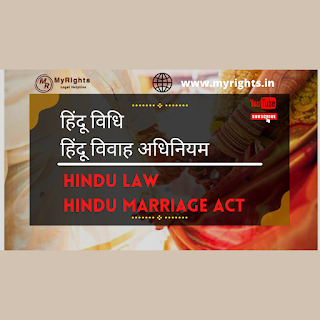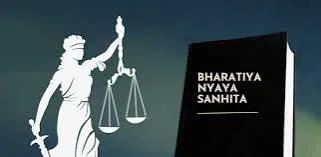Know what is Restitution of Conjugal Rights

Marriage under Hindu law is a mixed form of both a contract and the sacrament. Even if marriage under Hindu law is considered a ritual, it seems a family contract under the current Hindu Marriage Act 1955 (The Hindu Marriage Act, 1955). When two parties conclude marriage among themselves, after the completion of such marriage, some social rights and obligations are born within both of them.
After marriage, the parties of marriage live together and both have the right to associate with each other. The life of both is spent under the right to companionship. Both parties of the marriage also create children after the marriage is completed.
There may also be some disputes over time while living with both parties of marriage. Sometimes disputes increase and the situation of separation of marriage stands up. When there is a breakdown of marriage, it seems to be a big social crime, because after marriage, the children are also born.
Under such circumstances, the upbringing of children becomes very painful. The upbringing of the child born from marriage falls on both parties of marriage on husband and wife. It is the responsibility of the two parties to take care of their children while staying together. Sometimes such a situation comes when it becomes difficult to keep both of them tied to the married formula.
The Hindu Marriage Act 1955 provides some opportunities to the parties of marriage before the break of marriage. Through this Act, an attempt has been made that as far as the marriage is not there, the parties of the marriage should be together. Section 9 has been included under this Act for the purpose of keeping the parties of marriage together. Section 9 of the Act is related to Restitution of Conjugal Rights.
Section 9 of Hindu Marriage Act 1955
When any of the parties of the marriage have left the second party of marriage without any reasonable cause, the party who has left in such a situation can take refuge in the court. Section 9 of the Hindu Marriage Act 1955 empowers the party to the party to call the party of marriage back to stay with him through the court.
According to the words of the section of the Act
‘While any of the husband or wife have proclaimed their companionship from another without a rational opinion, then the anticipated party will be able to apply by a petition for the abolition of marital rights in the District Court and the court will not have any valid basis to approve the truth about the truth about the statements made in such a petition.
Explanation- Where the question arises whether there is a rational appropriate to print from companionship, the burden of proving rational appropriately on the person who has proclaimed with companionship.
The section of the Act consists of the treatment that the person who has overcome himself from companionship cannot submit a petition for the upheaval of married rights, but the petition makes the side which has been removed from companionship.
Pannombalam vs Saraswati AIR 1975 Madras 693 Explaining this section, it has been said that the distressed party has the right to obtain a degree from the court directing the departure of married rights, but it does not mean that the observer can receive his wife by harassment or forcefully nor does it intend that the wife has to commit self -proclaimed self. If it is not complied for 1 year after obtaining a decree of the departure of married rights, then later the mandatory can be a good basis to get the decree of the marriage separation.
The release of married rights in brief means that to restore broken matrimonial relations, that is, the marital rights of husband and wife were disappeared for any reason. It is the basic objective of marriage to revive them.
Husband and wife are living together and spend that happy married life and get the companionship of each other where any party from the husband and wife leaves the other party’s co -dealer without any reasonable reason, that is, if the other parties prize, then in that case the party can get the degree of posting the rights of the rights from the court.
T Saraitha vs Venkatasubaiya AIR 1983 Andhra Pradesh 356 There is a episode of. In this case, questions were raised about the constitutionality of Section 9 of the Hindu Marriage Act 1955. For this, the petitioner had said that Section 9 of the Hindu Marriage Act is against women and it encroachs the rights of women. This section Article 14 is against the right to equality described in the Constitution of India and is contrary to fundamental rights.
On this, the Andhra Pradesh High Court ruled that Section 9 gives treatment to the applicant to receive the association of the response. The right to sexual intercourse also includes the meaning that the husband can make his wife a means to produce a creature contrary to his wish through this treatment.
It has been decided that both sexual intercourse and breeding fall into the field of freedom, if the method compels a person for sexual intercourse, then it is a violation of human dignity, in fact it is against this civilized society. This is a severe violation of his personal freedom.
The court expressed the opinion that the present stream kills the right to freedom of the woman under which she has the right whether she becomes a victim of another person’s lust or not. Section 9 of the Hindu Marriage Act 1955 was declared unconstitutional by the court.
But after a few months of this decision given by Andhra Pradesh High Court, Delhi High Court Mrs. Harminder vs Harvinder Singh AIR 1986 Delhi 66 In case of the Andhra Pradesh High Court’s decision, he expressed his vote and said that it would be extremely unsuitable to implement constitutional provisions in family matters. This will mercilessly destroy the institution of marriage.
Article 21 and 14 Indian Constitution has no place in married life and other family matters. Only the legislature can neutralize it through the Act. The Delhi High Court while commenting from the Andhra Pradesh High Court said that unnecessary emphasis should not be given on sex. Sexual intercourse is included in the cooperative but is not mandatory. The Delhi High Court emphasized the social utility of the current stream. Sometimes husband and wife become proud due to lack of mutual differences and dialogue or due to conspiracy of relatives, in such a situation this treatment is sitting for utility.
Reasonable reason
Under Section 9 of the Hindu Marriage Act 1955, when a party of marriage is left by a party, there should be a reasonable reason behind leaving it. The reasonable reason under Section 9 of this Act has been emphasized. What will be a reasonable reason, it changes according to the circumstances of each case and the reason cannot be tied in any word.
The court asks whether it is appropriate for a prudent person to leave his marriage in particular in the case of suit! For what reason a party has left the other party, special emphasis is laid on it. The reasons will be appropriate through some cases coming from time to time, it has been decided by the court.
Cruelty and mercilessly behaving against the wife is a reasonable reason. In the case of Rajkumar vs Harishchandra 1985 (1) HLR74, it has been said that if cruelty is treated against the wife by the husband, it will be a reasonable reason to give up companionship.
Anna Sahab vs Tarabai AIR 1970 Madhya Pradesh 36 In the case of this, it has been said that only the person leaving the rational reason will have to be proved.
Pritam Kaur vs Jaswant Singh 1985 HLR 455 It has been said in the case of the case that making false allegations against the wife will be a reasonable reason for the wife to leave the house.
Swaraj Garg vs KM Garg AIR 1978 Delhi 296 It is said in the case of. In the case of a wife working at a different place from the husband’s work place, this reason is also a reasonable reason to quit companionship.
Chandra vs Saroj AIR 1975 Rajasthan 88 In the case of this, it has been said that if the wife does not get intoxicated and does not eat meat and still the wife is being allowed to drink alcohol and she is being asked to get intoxicated or will be a reasonable reason to leave home.
Deepa Sayal vs Dinesh Sayal AIR 1993 Allahabad 224 In the case of this, it has been said that all the basis of judicial separation and marriage separation under the Hindu Marriage Act 1955 will be considered as a reasonable reason for leaving the Aadhaar companionship. After this episode, the rational reason has not been going to give rise to the word confusion and today this word has become prosperous. The burden of proving the reasonable reason is on the party who has left the companionship for such a reason.
For example, as a wife leaves a husband’s house, in such a situation she gives a recommendation in the court that she has left her husband’s house due to her cruel behaving and she will not go to her house anymore. The wife has to prove this ‘cruel’ behavior.
In which District Court can the application of Section 9 of the Act be given-
Applications under Section 9 can be submitted to the District Court in which the persecuted party under the local authority of the District Court, but keeping in mind the convenience of the wife, such an application can be transferred to the district court in which the wife is residing within the area rights of the District Court.

